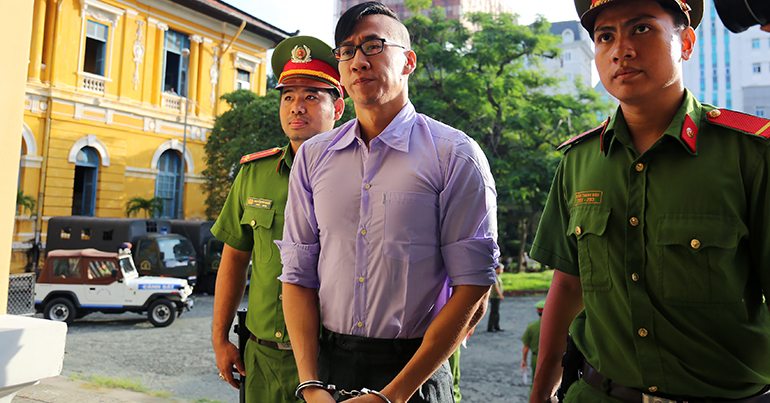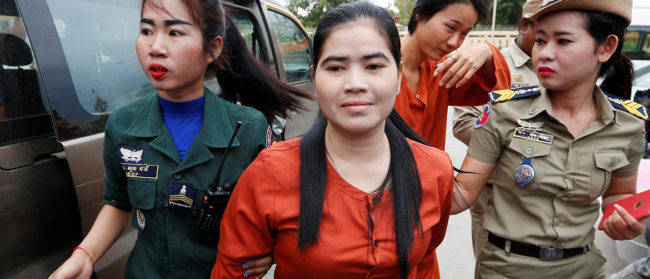Will Nguyen happened to be visiting Vietnam back in June of this year when demonstrations erupted around the country, with protesters railing against proposed special economic zones which they said could disadvantage the locals in favour of rich Chinese investors.
After being swept up in the demonstrations, Nguyen was beaten and arrested for disrupting public order. A Ho Chi Minh City court, which could have given him seven years in prison, instead deported the Yale graduate, who told Southeast Asia Globe from his home in Houston, Texas, “The fear in the air as we hit up against each of the barriers was palpable.”
What exactly happened at the protest in Ho Chi Minh City on 10 June?
I was completely awed by this unprecedented display of people power and sought to let the world know what was happening, even tagging international media in some of my Twitter posts. But as the protests grew and we began marching towards the city centre, police started erecting barriers using buses, trucks and officers with shields to prevent protesters from going any farther. It was at this point that I began taking a more active role… And so I came to the fore of the protest and helped them push through each of the barriers.
The fear in the air as we hit up against each of the barriers was palpable and there were sporadic shoving matches between the police barrier and the protesters, which I sought to prevent as much as possible. I knew claims of violence would be used to delegitimise these protests. The protesters – of all ages – were shouting at these young male police officers to let them through. And as their superiors screamed at them to hold the line, the young police officers looked as scared and uncertain as we protesters were.
So I pushed through. I knew once the dam was breached, the sheer number of protesters would easily overwhelm the minority of officers, whose hearts weren’t in it to begin with. This scene repeated itself two to three times over, and I would often stand between the protesters and the police to let the people pass through without further violence.
By the time we approached the intersection of Ly Chinh Thang and Nam Ky Khoi Nghia, the public security bureau… chose to park a row of trucks across the intersection… So I climbed onto the bed of one of the trucks and began helping protesters over, one-by-one… We began moving police motorbikes that were parked on the sidewalk (as an extension of the barrier), opening up a pathway for the rest of the protesters to continue through… A young woman pulled me aside and whispered to me that I was about to be taken in, that she had overheard officers singling me out for arrest. She told me to merge back into the crowd as quickly as I could.
But before I could find safety in numbers, a group of plainclothes men descended on me. A bunch of protesters immediately tried to rescue me, pulling me from the grasps of these men, but these men began beating me about the head and face and knocked me to the ground. And before I knew it, I was being carried away and thrown onto a police truck.
What is it like being detained by foreign agents as an American citizen? What was going through your mind?
Hard to say – as a Vietnamese-American able to communicate with them in their native language, I occupied a nebulous zone; they treated me with gloves on but were at relative ease about what they could say to me. I was “same-same, but different”. And they were constantly surprised that I knew my way around Vietnamese food and restaurants in the city. One of the police officers actually wrote down for me a list of places he recommended.
As for what was going through my mind, I could write a whole book about that. Uncertainty was the pervasive emotion, more so than fear. I knew they wouldn’t kill me, but the possibility of torture, especially during the first few days of interrogation –when they were convinced I was a subversive agent – definitely crossed my mind. Fortunately, none of that happened. They never laid their hands on me after the day of the protest.
How much pressure was there on you to admit to illegal activities in court? Looking back, do you think you committed any crimes that day?
“Disturbing public order” is a broad act and purposely ill defined in Vietnamese law to serve as a catchall to prosecute public assembly or protest. I can readily admit that I violated Vietnamese law, that I committed a “crime” under their definition of “disturbing public order”, but I argue to this day that I have done nothing “wrong”.
Protests are in several ways meant to disturb public order to draw attention to a pressing social or political issue. That [this] protest – a healthy manifestation of democracy – has been twisted to be, by definition, “illegal” is an egregious injustice for the Vietnamese people, especially given that the right to assembly is guaranteed in their constitution.
How were you treated in detention? Were guards and other detainees hostile or friendly?
I was generally treated well and the vast majority of officials and guards I dealt with throughout the entire experience were friendly. We regularly joked around with one another. Here, too, I could see cracks in the regime’s facade. On several occasions, I actually had people apologise to me for putting me in handcuffs or for treating me like a criminal. They usually asked for understanding, explaining to me that they were only carrying out orders. They knew my actions came from a good place, that they were a natural extension of the nationalism that we, Vietnamese, are taught from birth. The night I was brought to Chi Hoa Prison, an official despondently admitted that I was of “good character” and that he hoped I wouldn’t be there too long.
Even fellow detainees treated me in higher standing because of the political nature of my crime, as opposed to their “lowly” drug or gambling offenses. The implicit message from many people I interacted with, of course, was that my arrest and imprisonment were unjust.
Should the US be doing more to encourage respect for human rights and democratic processes in Vietnam and other countries?
Yes. [President Donald] Trump’s presence has certainly emboldened authoritarian governments to misbehave. But the effect is curbed somewhat in Vietnam as opposed to, say, China. The desire to maintain a good economic/political relationship with the US keeps Vietnam from veering too far off the rails in terms of human rights, though
violations have certainly increased under Trump’s and [General Secretary Nguyen Phu] Trong’s administration. Speaking to Vietnamese officials within the public security bureau and the prison system, I got the sense that economic incentives speak louder than moral imperatives.
What is your hope for the future of human rights in Vietnam, and would you like to be involved? Can you or will you go back?
I will certainly be involved, and I would definitely like to go back. I made it clear as such in my closing statement in court: “I’d like to return in the future to contribute… to the development of a strong, modern, democratic Vietnam.” And as far as I know, I haven’t been formally banned from re-entry for any period of time. Still, I’ll give it a few years – for my mother’s sake.


